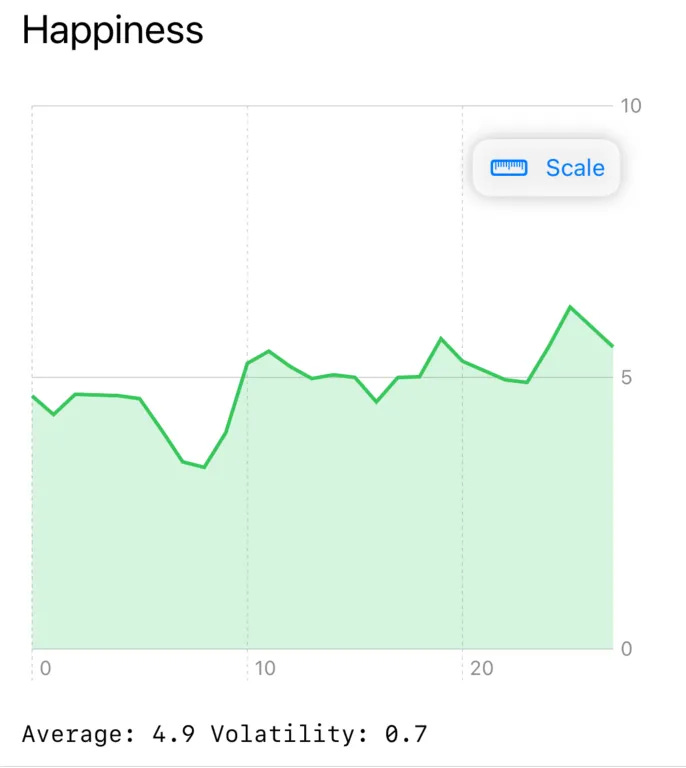ConsciousInsights is a lifestyle and wellness iPhone App that leverages LLMs to help to break down trends and patterns in your happiness over time.
How ConsciousInsights works?
The app prompts you to write a short description of your day and then utilizes an algorithm that processes LLM outputs to generate a happiness score ranging from 1.0 to 10.0, which is then graphed over time. For monthly and longer-term views, the app applies a moving average since we're more interested in trends than individual scores. Our metrics include average happiness and standard deviation (volatility) to identify the range of your experienced happiness
Additionally, we quantify how different life categories—relationships, health, career, sleep, finance, leisure, weather, and other factors—contribute positively or negatively to your happiness.
Is ConsciousInsights an AI journaling app?
While ConsciousInsights often gets comparisons to journaling apps, there are key differences. Unlike traditional journaling focused on mindfulness, ConsciousInsights emphasizes writing precise, succinct descriptions of your day. Most people can easily identify what was good or bad about their day, but recognizing patterns over 3-6 months or even longer becomes increasingly difficult as time passes.
The fundamental challenge is that human memory is unreliable. We don't remember events accurately, and our recollections become biased by our current circumstances. Similarly, others' analyses of us are colored by their own experiences. ConsciousInsights addresses this by aggregating patterns in your happiness over time.
The daily writing component isn't about journaling—it's about accessing your mind. Consider how therapists and psychiatrists rely on conversation for diagnosis; words are the most effective way to understand happiness. Wearables like Oura Ring and Whoop capture biological signals, but they miss the deeper understanding that only comes through language.
A core philosophy of ConsciousInsights is eliminating self-analysis of happiness. Many emotion-tracking apps like Daylio or Reflectly ask you to self evaluate your day/mood. I want to challenge this approach, which is similar to a doctor asking you to rate pain from 1-10. Humans struggle to accurately quantify these values, and your assessment can be heavily influenced by your current emotional state.
By focusing on writing a quick summary of what you did during the day and your feelings about specific events, we gain a much clearer picture of your happiness. Though our daily routines may be similar, our perceptions of events and emotional responses reveal significant insights about our overall happiness.
What inspired ConsciousInsights?
The inspiration for ConsciousInsights comes from when I was in high school. I noticed that life always felt like a series of ups and downs.
I felt like there were a few week periods where I did well in school without trying too hard, and other periods where everything felt difficult and I needed to study hard to ensure I got a satisfactory grade. Similarly, when playing basketball or any sport I've always encountered these up and down periods.
I feel this is a very normal experience that everyone goes through. We can see athletes all the time have these periodic hot and cold periods. So I thought, what if there was a way we could measure our happiness and understand these patterns? These observations led me to consider the biological basis of our emotions.
Ultimately our emotions are a result of chemical reactions and chemical reactions follow measurable and cyclical patterns. So I feel it's reasonable to assume that our happiness should also follow measurable and cyclical patterns.
Why does this matter?
Regardless of how cyclical our happiness patterns may be, understanding the range of emotions we experience can help us better understand ourselves. Being able to visualize and quantify your happiness can reveal how your life is trending and allow you to make changes before you end up in a dark place. This is my attempt to measure happiness in a way that has never been done before.
How do I try this out?
Available for iPhone and iPad, here is the App Link.








Great start. I think you are overlooking a fact in your approach. I hope my words may help you.
If you take away the practice of retrospectives, thinking about your past (be it just your day or week) and evaluate, you remove the practice of a key feedback loop and introduce a delay. While it is true that our judgement is temperamental and fleeting, always mutating and not stable, our emotions are tied to it by biology. Trying to take this away in search of objectivity will make the swings more pronounced, not less.
I think you'll create better results if you both include the feedback loop over months from your approach, and the self-reporting. Without both, it is harder to see how our body and mind are often mere flags agitating in the strong winds of circumstances. Becoming aware of the changing nature of everything, including our own thoughts, is the path to seeing that we are not our body nor we are our minds. These are changing phenomena that we can leave in the past, start anew leaving the past conditioning aside. Training this insights is, in my humble opinion, the path to healing and a little wisdom that is helpful in life.